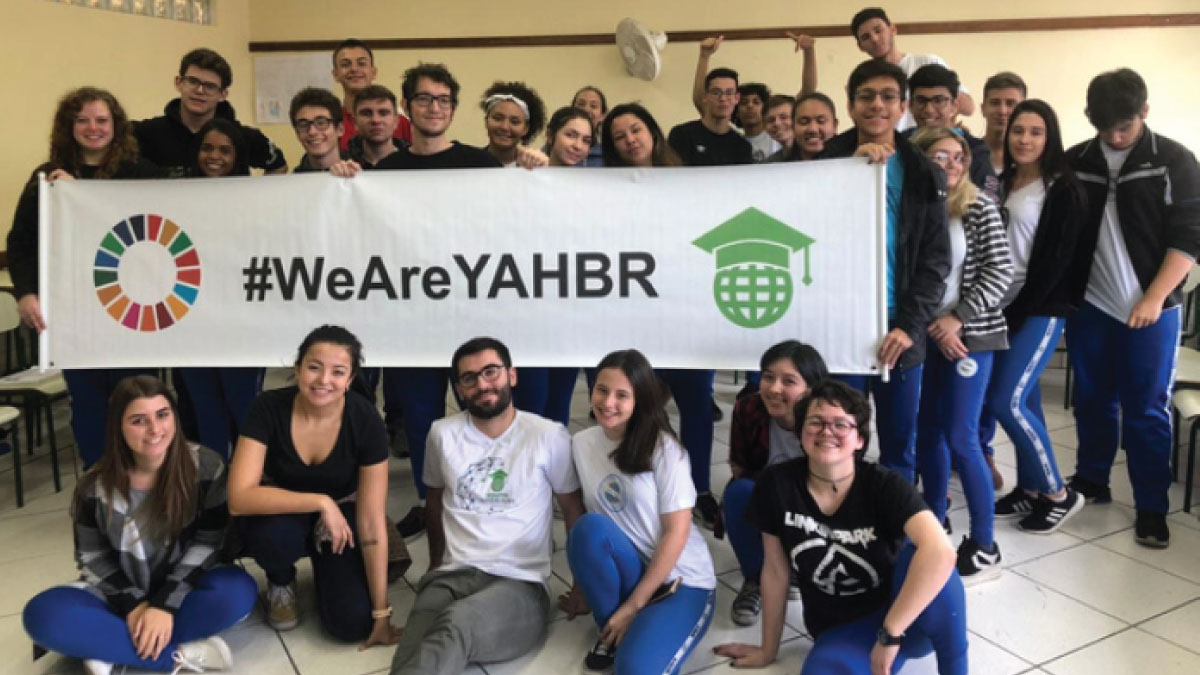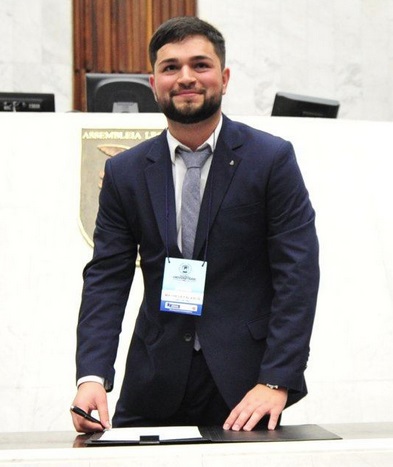Youth Action Hub Curitiba, part of the UNCTAD Youth Network, harnesses the potential of Brazilian youth to help accelerate the implementation of the 2030 Agenda for Sustainable Development.
Members of Youth Action Hub Curitiba, part of the UNCTAD Youth Network of change makers. Photo credit: Matheus Felipe Falasco
As the world continues to battle the COVID-19 pandemic, a group of Brazilian students and young professionals led by Matheus Felipe Falasco, who coordinates the UNCTAD-supported Youth Action Hub Curitiba, are promoting sustainability as a key component of a resilient post-pandemic recovery.
From educating the youth on sustainable practices to developing skill-building courses for young people, they’re leading the charge towards a more sustainable future within their communities.
“If we want future generations to have a dignified and high-quality life, we need to transition to a more sustainable society,” Mr. Falasco says.
Young people under the age of 30 represent almost a third of the global population, according to the UN Population Fund. UN Secretary-General António Guterres describes them as “champions of sustainability”.
Harnessing youth potential
UNCTAD-supported Youth Action Hub Curitiba in Brazil.
Youth Action Hub Curitiba, part of the UNCTAD Youth Network of change makers, focuses on harnessing the potential of Brazilian youth to help accelerate the implementation of the 2030 Agenda for Sustainable Development through partnerships with the state government, civil society and the private sector.
But, according to Mr. Falasco, the UN-led agenda is not widely known among young people and other vulnerable groups in Paraná, a state in southern Brazil. “We saw this as an opportunity to raise public awareness and encourage social engagement in sustainable development at the grassroots level,” he said.
Before the pandemic hit, the group focused on raising awareness on the basic concepts of sustainability and educating students to make them agents of change on pressing global issues.
“Our objective was to empower youth to play an important role in defining and addressing worldwide challenges beyond the 2030 deadline,” Mr. Falasco said. His group has educated more than 15,000 youth on various topics through university visits and virtual workshops since 2019.
“We hope our seminars on the global goals will advance cooperation at local and state levels, and inject new energy into regional efforts to realize the 2030 Agenda,” he said.
Nurturing sustainability ambassadors
After the COVID-19 crisis caused nationwide lockdowns and disrupted schooling in Brazil, Mr. Falasco and his team continued raising awareness through social media livestreams and online lectures, promoting youth-led innovation to address community problems.
Elevating youth solutions to solve global issues was one of the key themes of this year’s UN ECOSOC Youth Forum in April, and remains the focus of the International Youth Day 2021 to be marked on 12 August.
The importance of equipping young people with the necessary leadership skills to make them champions who will shape the path towards a more equal and resilient future has never been greater.
Following the UN’s call to rebuild societies better in the wake of the pandemic, Mr. Falasco believes young people should take part in creating innovative solutions that work for all.
Looking ahead
Next year, Youth Action Hub Curitiba plans to launch a new programme called “Decade of Action” in partnership with the Paraná state government and seven state universities.
It will be aimed at promoting awareness about sustainability and activating a new generation of youth ambassadors of the 2030 Agenda to develop – through a virtual hackathon – solutions to the social, economic and environmental issues laid bare by the pandemic.
“Young people must understand the issues surrounding them and how to create concrete and sustainable solutions. This is why we want to empower the next generation of decision makers and citizens to have a sustainable mindset,” Mr. Falasco says.
The group hopes to teach more than 100,000 students how to apply sustainable practices in their daily lives and equip them with the soft skills to successfully transition into the labour market.
“Everyone wants to change the world but every big change happens in small steps,” concludes Mr. Falasco, who will be one of the speakers at the UNCTAD15 Youth Forum slated for 16 to 18 September.
Created in 2018, the Youth Action Hubs initiative empowers young people to think globally and express their views on matters within UNCTAD’s mandate.
It enables them to act locally as game changers in their communities by setting up projects related to the UN Sustainable Development Goals. Currently, there are 46 Youth Action Hubs worldwide.


